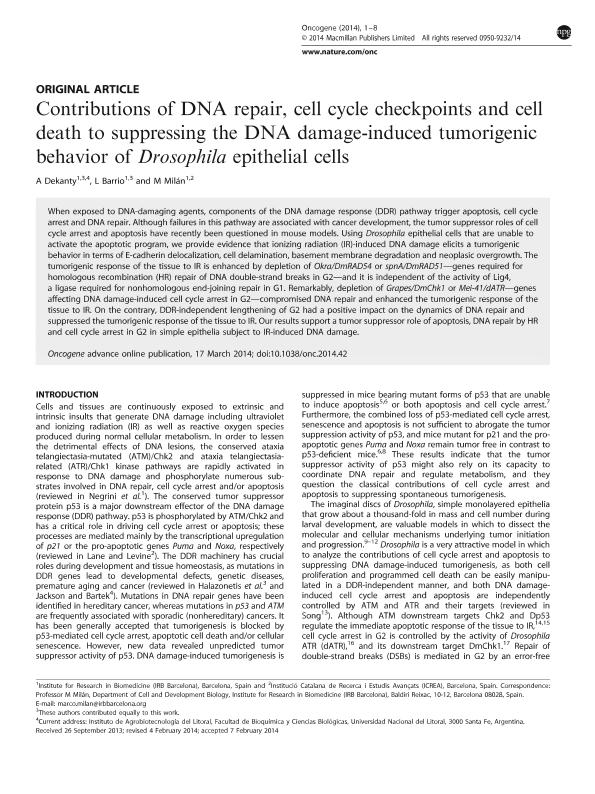Mostrar el registro sencillo del ítem
dc.contributor.author
Dekanty, Andres

dc.contributor.author
Barrio, L.
dc.contributor.author
Milán, M.
dc.date.available
2019-09-29T14:22:46Z
dc.date.issued
2015-02
dc.identifier.citation
Dekanty, Andres; Barrio, L.; Milán, M.; Contributions of DNA repair, cell cycle checkpoints and cell death to suppressing the DNA damage-induced tumorigenic behavior of Drosophila epithelial cells; Nature Publishing Group; Oncogene; 34; 8; 2-2015; 978-985
dc.identifier.issn
0950-9232
dc.identifier.uri
http://hdl.handle.net/11336/84770
dc.description.abstract
When exposed to DNA-damaging agents, components of the DNA damage response (DDR) pathway trigger apoptosis, cell cycle arrest and DNA repair. Although failures in this pathway are associated with cancer development, the tumor suppressor roles of cell cycle arrest and apoptosis have recently been questioned in mouse models. Using Drosophila epithelial cells that are unable to activate the apoptotic program, we provide evidence that ionizing radiation (IR)-induced DNA damage elicits a tumorigenic behavior in terms of E-cadherin delocalization, cell delamination, basement membrane degradation and neoplasic overgrowth. The tumorigenic response of the tissue to IR is enhanced by depletion of Okra/DmRAD54 or spnA/DmRAD51 - genes required for homologous recombination (HR) repair of DNA double-strand breaks in G2 - and it is independent of the activity of Lig4, a ligase required for nonhomologous end-joining repair in G1. Remarkably, depletion of Grapes/DmChk1 or Mei-41/dATR - genes affecting DNA damage-induced cell cycle arrest in G2 - compromised DNA repair and enhanced the tumorigenic response of the tissue to IR. On the contrary, DDR-independent lengthening of G2 had a positive impact on the dynamics of DNA repair and suppressed the tumorigenic response of the tissue to IR. Our results support a tumor suppressor role of apoptosis, DNA repair by HR and cell cycle arrest in G2 in simple epithelia subject to IR-induced DNA damage.
dc.format
application/pdf
dc.language.iso
eng
dc.publisher
Nature Publishing Group

dc.rights
info:eu-repo/semantics/openAccess
dc.rights.uri
https://creativecommons.org/licenses/by-nc-sa/2.5/ar/
dc.subject
DNA DAMAGE RESPONSE
dc.subject
TUMORIGENESIS
dc.subject
DROSOPHILA
dc.subject
ANEUPLOIDY
dc.subject.classification
Bioquímica y Biología Molecular

dc.subject.classification
Ciencias Biológicas

dc.subject.classification
CIENCIAS NATURALES Y EXACTAS

dc.title
Contributions of DNA repair, cell cycle checkpoints and cell death to suppressing the DNA damage-induced tumorigenic behavior of Drosophila epithelial cells
dc.type
info:eu-repo/semantics/article
dc.type
info:ar-repo/semantics/artículo
dc.type
info:eu-repo/semantics/publishedVersion
dc.date.updated
2019-09-27T14:14:25Z
dc.journal.volume
34
dc.journal.number
8
dc.journal.pagination
978-985
dc.journal.pais
Reino Unido

dc.journal.ciudad
Londres
dc.description.fil
Fil: Dekanty, Andres. Consejo Nacional de Investigaciones Científicas y Técnicas. Centro Científico Tecnológico Conicet - Santa Fe. Instituto de Agrobiotecnología del Litoral. Universidad Nacional del Litoral. Instituto de Agrobiotecnología del Litoral; Argentina
dc.description.fil
Fil: Barrio, L.. Irb Barcelona - Institute For Research In Biomedicine;
dc.description.fil
Fil: Milán, M.. Irb Barcelona - Institute For Research In Biomedicine;
dc.journal.title
Oncogene

dc.relation.alternativeid
info:eu-repo/semantics/altIdentifier/url/http://www.nature.com/onc/journal/vaop/ncurrent/full/onc201442a.html
dc.relation.alternativeid
info:eu-repo/semantics/altIdentifier/doi/http://dx.doi.org/10.1038/onc.2014.42
Archivos asociados
